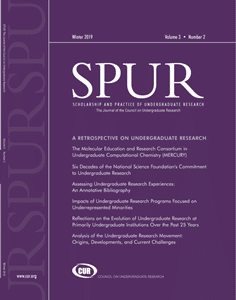SPUR (2019) 3 (2): https://doi.org/10.18833/spur/3/2/1
The author discusses the history of the Molecular Education and Research Consortium in Undergraduate Computational Chemistry (MERCURY), which has made significant contributions benefiting science faculty and undergraduates. The peer review publication rate of 1.7 for MERCURY faculty is 3.4 times the average rate for physical science faculty at primarily undergraduate institutions. Since 2001, 888 students have worked on research projects; 75 percent of them have come from underrepresented populations, such as female students or students of color. Approximately half of all graduates have pursued advanced degrees in STEM fields; two-thirds of this group have been female and/or students of color. More than 1,600 people have attended the 18 MERCURY conferences that have hosted 111 speakers, including 61 who were faculty members of color or female.
More Articles in this Issue
No posts found


